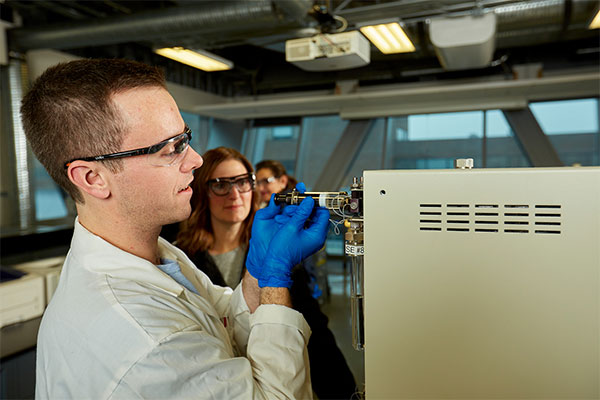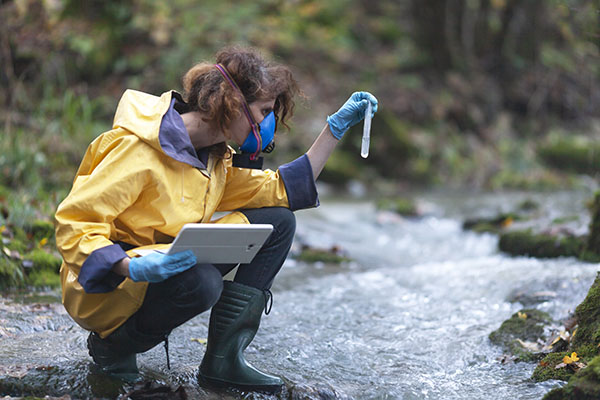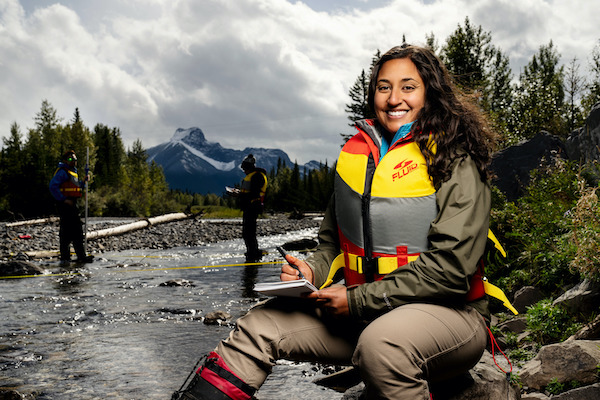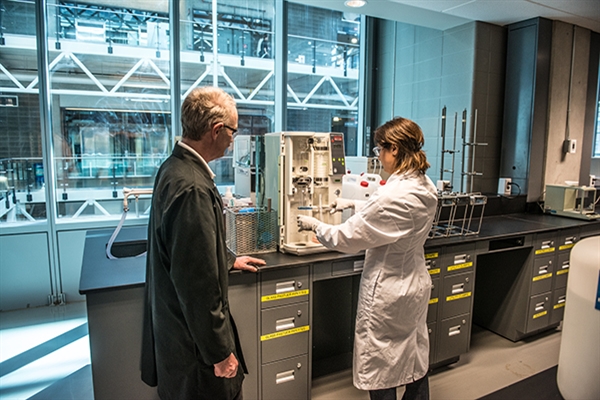On this page:
Overview
The Water and Wastewater Treatment Operations program is designed to provide you with the essential knowledge and practical skills required for a successful career in the water and wastewater industry.
This program, crafted by industry professionals, blends in-class theory with hands-on training to prepare you for the Alberta Water and Wastewater Operators (AWWOA) and Alberta Boiler and Safety Association (ABSA) Fourth-Class Power Engineering certifications.
As a student, you will:
- learn the science behind water and wastewater treatment, including water chemistry, microbiology and the physical treatment processes necessary to meet stringent environmental safety and public health standards
- complete extensive laboratory and fieldwork, allowing you to gain practical experience in the operation of treatment facilities, maintaining equipment and performing critical water quality tests
- learn how to troubleshoot and understand the regulatory and environmental issues related to water and wastewater management
- learn to operate and maintain boilers, steam systems, turbines, pumps, valves, plant water treatment systems, instrumentation and other plant equipment related to the water and wastewater domain.
The program often includes interaction with industry professionals and potential employers, offering networking opportunities and insights into current industry practices.
Water treatment and power engineering certifications
Water and wastewater treatment operators work in municipal water treatment facilities, industrial water and wastewater operations, equipment manufacturing, steam generation, power generation, water recycling, environmental consultancy, and companies specializing in emerging water technologies.
As a graduate, you can pursue various roles such as junior water/wastewater operator, fourth-class power engineer in municipal or industrial settings, or sales representative in water treatment technologies once fully certified.
Through in-class related lab experience and recognized work experience, you'll be prepared to write industry-required ABSA certification exams for Fourth Class Power Engineering and AWWOA Small Systems plus Level 1 Water/Wastewater Treatment certification.
By the end of this one-year program, you'll be well-equipped to start your water and wastewater treatment career.
Water and wastewater treatment operators tend to be objective, innovative, detail-oriented and methodical.
You need:
- a strong sense of workplace health and safety
- good hearing, eyesight and colour vision
- good health and stamina
- the ability to climb ladders, lift, bend and work in awkward positions
- manual dexterity
- mechanical interest and aptitude
- good math skills
- good speaking, reading and writing skills
- a careful and responsible approach to their work
- a strong work ethic.
You should enjoy using tools and instruments, studying test results and instrument readings, taking a systematic, step-by-step approach to collecting and analyzing samples, and providing reliable feedback to team members and leaders.
You'll participate in a four-month, 600-hour practicum during your final semester.
Your practicum will take place at a company or organization involved in water treatment, water distribution, wastewater collection and wastewater treatment systems.
This program will prepare you to apply for the following certifications:
- Alberta Water and Wastewater Operators (AWWOA) Small Systems and Level 1
- Alberta Boiler and Safety Association (ABSA) Fourth Class Power Engineering level.
You must write the exams and complete the required plant-time hours to earn your certifications.
After successfully completing this program, you'll receive a SAIT Water and Wastewater Treatment Operations certificate.
Careers and opportunities
Each year, SAIT conducts a survey between February and April to determine the employment rate, salary and satisfaction of our newest SAIT alumni.
![]() 90% graduate employment rate
90% graduate employment rate
![]() $69,160 average starting salary
$69,160 average starting salary
Find out more about our graduate employment statistics >
Our graduates may work in the following occupations. Some careers require additional experience and education.
Associated National Occupational Classification (NOC) codes: 21120, 74204, 90011, 92101.

Career planning support
Unsure which career path is for you? Here are some recommended career planning resources to help you decide your future.
You can also head to Alberta alis for lots of information about careers in Alberta, including quizzes and labour market information to help you narrow down a path.
Finally, you can take our online career finder quiz, which can help narrow your options based on your current skills and interests.
Courses
The Water and Wastewater Treatment Operations certificate requires 33 credits (12 courses) to complete.
The program spans one year, with three semesters.
| Course | Credits |
|---|---|
|
This course explores and develops skills for public speaking and technical presentations. Students will focus on technical writing for reports. Students will also develop resume styles to assist them in their job searches. |
1.5 |
|
This applied computer course provides students with critical electronic communications, data and file management skills, along with a strong focus on using common productivity applications to format, calculate, analyze, visualize, and present or report data and information. Equivalents:
|
1.5 |
|
You will be able to apply the skills learned in class through a four-month work practicum with a company or organization involved in water treatment, water distribution, wastewater collection and wastewater treatment systems. This will provide you with an opportunity to integrate theoretical knowledge and practical skills in on-site settings. Learners will be supervised and evaluated by industry partner staff Pre-requisites:
|
3 |
|
This course will prepare you to write the Alberta Boilers Safety Association (ABSA) Fourth Class Power Engineer's Certificate of Competency Part A exam. This course includes power theory instruction in the Power Engineering Profession, Effective Communications, Sketching and Drawing, Materials and Welding, Piping and Valves, Applied Mechanics, Thermodynamics, Basic Electricity, Boiler Systems Basic Controls and Instrumentation, Low and High Pressure Boiler Design, Construction, and Operations, Boilers Feedwater Systems and Fittings, and Systems Parts and Operations. Power theory classroom instruction will be coordinated with associated power lab application towards achievement of the Certificate of Competency. Corequsites:
|
3 |
|
This course will prepare you to write the Alberta Boilers Safety Association (ABSA) 4th Class Power Engineer's Certificate of Competency (Part A) exam. It includes the topics of Materials and Welding, Piping and Valves, Basic Electricity and Generators, Thermodynamics, Basic Control and Instrumentation, External and Internal Water Treatment, Boiler Feedwater Systems and Fittings, High Pressure and Low-Pressure Boiler Design and Operations, Steam Turbines, and Fittings, Parts and Operation. Your time in power lab will be spent applying principles learned in power theory instruction. Corequsites:
|
3 |
|
This course will prepare you to write the Alberta Boilers Safety Association (ABSA) 4th Class Power Engineer's Certificate of Competency (Part B exam). It includes the topics of Prime Movers, Engines, Air and Process Gas Compressors, Gas and Steam Turbines, Lubrication Systems, Pumps, Power Boilers, Heating Boilers and Associated Equipment, and Refrigeration, Heating. And Air-Conditioning Operations and Systems. Your time in power lab will be spent applying principles learned in power theory instruction. Pre-requisites:
Corequsites:
|
3 |
|
This course will prepare you to write the Alberta Boilers Safety Association (ABSA) 4th Class Power Engineer's Certificate of Competency (Part B exam). This course continues power theory instruction in the Power Engineering Profession. As well, it includes power theory instruction in Lubrication, Pumps , Compressors, Power Boilers, Heating Boilers, Boiler Plant Operation and Management, Boiler Safety Devices, Prime Movers, Engines, Gas and Steam Turbines, Refrigeration, Heating Ventilation and Air-Conditioning (HVAC), Building Environmental Systems, and a general review of Industrial Plant Operations. Power theory classroom instruction will be coordinated with associated power lab application towards achievement of the Certificate of Competency. Pre-requisites:
Corequsites:
|
3 |
|
In this course, you will learn about the reporting requirements in the water and wastewater industry. You will prepare simulated reports for federal, provincial and local governments, as well as First Nations regulatory agencies. You will address safety in the workplace by learning to conduct health, safety and environmental reviews of the safety standards, practices and certificates that are required in the industry. You will also explore risk assessments in water and wastewater facilities. |
3 |
|
Using laboratory procedures, you will explore the fundamentals of process control and regulatory testing. You will get hands on experience in the water and wastewater labs conducting testing as per the American Water and Wastewater Association (AWWA) standards and methods. You will also receive the framework for troubleshooting operational upsets and ways to optimize the water and wastewater process. Pre-requisites:
|
3 |
|
This course explores wastewater treatment and collection systems. You will gain an understanding of operator responsibilities and wastewater treatment operational management, starting with a wastewater source and ending with a receiving water body. Through theory and labs, you will learn how to operate a variety of wastewater treatment and collection systems. Pre-requisites:
|
3 |
|
This course examines water treatment and distribution systems. You will learn about the management of these operations from the source to the tap. Through theory and labs, you will gain the knowledge and skills to operate a wide variety of water treatment and distribution systems. Pre-requisites:
|
3 |
|
This course provides an overview of treatment processes in municipal water and wastewater treatment plants and industrial wastewater treatment. Students will start with the basic knowledge of water chemistry and water analysis techniques. Students will examine the processes of municipal and industrial wastewater generation, preliminary treatment, physical-chemical treatment, filtration and membrane separation, softening and organic matter removal, as well as explore the role of a water operator in plant operation and maintenance. Students will review - water and wastewater treatment process, identify key treatment equipment, explain the working mechanisms of the equipment, safely perform maintenance on the equipment, collect representative samples, perform laboratory testing, and interpret and apply analysis data in the process operation. |
3 |
Progression
You must attain a PGPA and/or a CGPA of 2.0 or better each semester and pass the prerequisite courses to progress through the program.
To qualify for graduation, you must pass all courses, attain a CGPA of 2.0 or better and complete course requirements within the prescribed timelines.
Review our grading and progression procedure >

Explore your options!
Some courses in this program are available through Open Studies. You can complete courses via Open Studies to get a head start on your education, reduce your course load once accepted into a credentialed program, or determine which career path best suits you before you fully commit.
You may also take courses for general interest or personal and professional development.
Admission requirements
Applicants educated in Canada
Applicants must demonstrate English language proficiency and completion of the following courses or equivalents:
- at least 50% in English Language Arts 30-1 or English Language Arts 30-2, and
- at least 50% in Math 30-1 or 60% in Math 30-2, and
- at least 50% in Chemistry 30, and
- at least 50% in Biology 20.
SAIT accepts high school course equivalents for admission for applicants educated outside Alberta.
All applicants who were educated outside of Canada must demonstrate English language proficiency and provide proof they meet the program admission requirements outlined above with an international document assessment. Find accepted educational documents and assessment options.
SAIT may also accept courses completed at certain international post-secondary institutions.

Academic Upgrading
Missing an admission requirement for this program? Upgrade your prior education to help you receive admission into one of SAIT's career programs.

English language proficiency
All applicants must demonstrate English language proficiency prior to admission, including students educated in Canada.
Transfer agreements
At SAIT, we evaluate post-secondary credit you have previously earned and apply it to your SAIT credential. Explore our formal transfer agreements available for this program.
We can evaluate your prior education, even if we don't have a formal agreement in place.
Submit a transfer credit application
There are no formal transfer agreements currently in place for this program.
Transfer options for graduates
Build on the knowledge you’ve learned at SAIT. The opportunity to advance your education at an accredited post-secondary institution may be available.
🔗 Visit Transfer Alberta search tool for all transfer agreements in Alberta (including UCalgary, MRU and BVC).
If there are transfer agreements with other institutions outside of Alberta, nationally or internationally, they will be listed below.
Available intakes
Fall 2025
Start dates:
- Domestic students: Open
-
-
Application deadline: June 30, 2025
-
- International students: Open
-
-
Application deadline: May 30, 2025
-
Costs
2025/26 tuition and fees
The following estimated costs are effective as of July 1, 2025.
The estimated total cost of tuition and fees is based on the suggested schedule of study. Following a modified schedule will impact the fees you pay per semester and may alter final costs.
Domestic students
*.5 indicates a combination of full-time semester(s) and part-time semester(s) in the same academic year. In many cases, students are completing a practicum during their part-time semester. Part-time students are those taking less than nine (9) course credits in a semester. You are not eligible for the UPass during a part-time semester.
The program total is based on the estimated amount you will pay if you enter this program during the 2025/26 academic year. The program total amount listed on your letter of admission may appear higher. This amount is your maximum tuition guarantee for the program. SAIT will not exceed this maximum, regardless of changes in tuition and fees between academic years.
*.5 indicates a combination of full-time semester(s) and part-time semester(s) in the same academic year. In many cases, students are completing a practicum during their part-time semester. Part-time students are those taking less than nine (9) course credits in a semester. You are not eligible for the UPass during a part-time semester.
Books and supplies are approximately $1,000 - $1,500 per full-time year.
This is a bring-your-own-device program with a standard computer hardware and software requirement. See the specific requirements on our computers and laptops page.
Find your booklist on the SAIT Bookstore's website. The booklist will be available closer to the program start date. Can't find your program or course? The bookstore didn't receive a textbook list. Contact your program directly to determine if they're still refining course details or if you're in luck; no textbook purchase is required this term.
The courses below will require Power Engineering Fourth Class Textbook Set - Part A, Part B and Academic Supplements from PanGlobal.
- PWEN 251
- PWEN 262
- PWEN 273
PWEN 274 will require Power Engineering Fourth Class Textbook Set - Part B and Academic Supplements from PanGlobal.
Required personal protective equipment (PPE)
The industry-approved PPE you'll need will be discussed during your first few days of classes.
You'll need a lab coat and CSA-approved safety glasses (with UVEX and side shields) to enter the chemistry labs.

Financial aid
Paying for your education may feel overwhelming, but we have resources and programs that can help, including information about payment options, student loans, grants and scholarships.
This program is eligible for Canada Alberta Job Grant funding.
Application process
Ready to apply?
Follow our step-by-step guide to submitting a successful application.
Communication during admission
Email is the primary source of communication during the selection process. Ensure your personal email account is managed appropriately to receive our emails, files and communications. We recommend you add the macphail.students@sait.ca domain to your safe senders' list or you risk missing critical email messages.

Begin your application
Apply now using the online application portal.
Ensure you have a valid Visa or Mastercard to pay the non-refundable application fee of $120 for domestic applicants or $175 for international applicants.
Information sessions
Prepare for a strong start in your chosen program or get the details you need to decide your future path.
Our expert staff and faculty are ready to answer your questions and provide information about the following:
- What sets SAIT apart
- An introduction to the program and area of study
- Admission requirements
- Future career paths
- Information on the earning potential and graduate employment rates.
Contact us
MacPhail School of Energy
-
Phone - 403.284.8451
International Student Advising
-
Phone - 403.284.8852
-
Email - international@sait.ca
Subscribe for updates
Your journey starts here! Sign up to get important updates on:
- Energy and environment programs
- Application information
- Relevant news and events

Oki, Âba wathtech, Danit'ada, Tawnshi, Hello.
SAIT is located on the traditional territories of the Niitsitapi (Blackfoot) and the people of Treaty 7 which includes the Siksika, the Piikani, the Kainai, the Tsuut’ina and the Îyârhe Nakoda of Bearspaw, Chiniki and Goodstoney.
We are situated in an area the Blackfoot tribes traditionally called Moh’kinsstis, where the Bow River meets the Elbow River. We now call it the city of Calgary, which is also home to the Métis Nation of Alberta.




